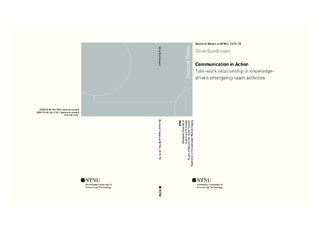Communication in Action: Talk-work relationship in knowledgedriven emergency team activities
Doctoral thesis
Permanent lenke
http://hdl.handle.net/11250/2606364Utgivelsesdato
2019Metadata
Vis full innførselSamlinger
Sammendrag
Norsk sammendrag
Kommunikasjon i handling
Forholdet mellom team-språk og teamarbeid i akuttsituasjoner
Når alarmen går på sykehuset rykker leger og sykepleiere med forskjellig spesialkompetanse ut for å hjelpe pasienter med livstruende tilstander. For å utnytte den samlede kompetansen til et slik akutt-team, er det viktig med god kommunikasjon.
Når sekundene teller, er teamkommunikasjon avgjørende for å jobbe sammen på en effektiv og sikker måte. De siste 30 årene har helsetjenesten fulgt anbefalinger fra andre høyrisiko organisasjoner (eks luftfart og forsvaret); «gullstandarder» for strukturert kommunikasjon er adoptert og tilpasset til medisinske team, og simulering er implementert som treningsmetode for å sikre godt samarbeid og god koordinering av oppgaver. Det overordnede målet med denne avhandlingen er å få mer kunnskap om forholdet mellom snakk og arbeid i team som jobber i medisinsk uavklarte akuttsituasjoner. Hensikten er å kunne påvirke kvaliteten på trening for tverrprofesjonelle akutt-team.
Avhandlingen er basert på en kvantitativ (artikkel 1) og to kvalitative studier (artikler 2-4). Datagrunnlaget er videoopptak og observasjon av simulerte og reelle mottak av kritisk syke pasienter, som ikke har vært utsatt for traumer. Første artikkel utforsker gjennomførbarheten av å sette opp en simulert modell i en travel klinisk akuttavdeling (in-situ), for å studere «teamarbeid» og «situasjonsforståelse». I de tre siste artiklene ble team-snakk og teamaktiviteter transkribert fra videoopptak av tverrprofesjonelle mottaksteam på sykehus. I artikkel 2 og 3 ble data samlet inn under in-situ simulering i en mottaksavdeling, og i artikkel fire studerte vi reelle tverrprofesjonelle mottaksteam i arbeid. Data ble analysert ved bruk av aktivitetsanalyse som er en diskursanalytisk metode.
Aktivitetsanalyse avdekket dynamikken og kompleksiteten i tverrprofesjonelt teamarbeid. Vi fant at språk har en viktig funksjon i «forhandling» om mening, i fordeling av oppgaver og ansvar, og i beslutningsprosesser i tverrprofesjonelle team som jobber i medisinsk uavklarte akuttsituasjoner. For økt pasientsikkerhet bør forholdet mellom språk og arbeid få større fokus i utdanning. I simuleringstrening for akutt-team bør man være bevisst på hvordan språk påvirker arbeidsprosesser, utover strukturerte «gullstandarder» fra andre høyrisiko organisasjoner. Summary
Background
Communication failures are a common cause of errors threatening patient safety in healthcare. Good communication skills are inextricably connected to good teamwork and are thus a prerequisite in complex medical emergencies when interdisciplinary teams, assembled in an ad hoc manner and under time pressure, treat patients with life-threatening illness. “Gold-standard” communication in medical emergencies is mainly derived from standards of crisis team management in other high reliability organizations (HROs), e.g., aviation and defence. As in these organizations, in the last 30 years, simulation has gained an international foothold as the training method for teamwork in healthcare. The overall objective of this thesis was to increase knowledge of the talk-work relationship in emergency teamwork to provide suggestions for improving team training.
Methods
This thesis is built on one quantitative and two qualitative studies using audio/video recordings and direct observations of teams admitting patients. Data have been collected from nursing team in situ simulations in an intensive care unit (ICU), interprofessional emergency team in situ simulations in an emergency department (ED), and real-life interprofessional emergency teamwork in an ED. The first study was based on a quantitative educational intervention study exploring the feasibility of using an in situ simulation model in the ICU assessing ‘‘Team Working’’ and ‘‘Situation Awareness’’ using the Anaesthetists' Non-Technical Skills (ANTS) system. In the second and third study, audio/video recordings were transcribed verbatim and activity analysis, a version of qualitative discourse analysis, was applied. The focus was to investigate functions of team-talk by analysing the interconnections between language and actions in communicatively and medically critical phases of teamwork.
Results
Paper 1: High clinical activity makes establishing an in situ simulation model within a busy ICU challenging but feasible. The intraclass correlation coefficient (ICC) between the two raters indicated moderate agreement in the two main categories of the ANTS system. Statistically, we found no differences. Paper 2-4: The activity analysis uncovered the dynamics and complexity of teamwork. In the knowledge-driven emergency team activities under study, language had an important influence in negotiating meaning, in the (re)distribution of responsibility and in team decisionmaking processes.
Conclusion
To improve communication skills in interprofessional knowledge-driven team activities, there is a need for focusing on the function of language in addition to standardized communication strategies. To improve the quality of team training, educators should include the influence that talking has on work processes. To influence patient safety, educators should be aware of the key role that simulation plays in building shared team mental models of how to speak during emergencies.
Består av
Paper 1: Gundrosen, Stine; Solligård, Erik; Aadahl, Petter. Team competence among nurses in an intensive care unit: The feasibility of in situ simulation and assessing non-technical skills. Intensive & Critical Care Nursing 2014 ;Volum 30.(6) s. 312-317 http://dx.doi.org/10.1016/j.iccn.2014.06.007Paper 2: Gundrosen, Stine; Andenæs, Ellen; Aadahl, Petter; Thomassen, Gøril Margrethe. Team talk and team activity in simulated medical emergencies: a discourse analytical approach. Scandinavian Journal of Trauma, Resuscitation and Emergency Medicine 2016 ;Volum 24.(135) - This article is distributed under the terms of the Creative Commons Attribution 4.0 International License (http://creativecommons.org/licenses/by/4.0/). https://doi.org/10.1186/s13049-016-0325-1
Paper 3: Thomassen, Gøril; Andenæs, Ellen; Gundrosen, Stine; Sarangi, Srikant. Discourse types and (re)distribution of responsibility in simulated emergency team encounters. Communication & Medicine. An Interdisciplinary Journal of Healthcare, Ethics and Society 2016 ;Volum 13. s. 51-70 https://doi.org/10.1558/cam.32148 Copyright © 2017 Equinox Publishing Ltd
Paper 4: Gundrosen, Stine; Thomassen, Gøril; Wisborg, Torben; Aadahl, Petter. Team talk and team decision processes: a qualitative discourse analytical approach to 10 real-life medical emergency team encounters. BMJ Open 2018 ;Volum 8:e023749.(11) s. 1-8 - Re-use permitted under CC BY-NC. No commercial re-use https://doi.org/10.1136/bmjopen-2018-023749
